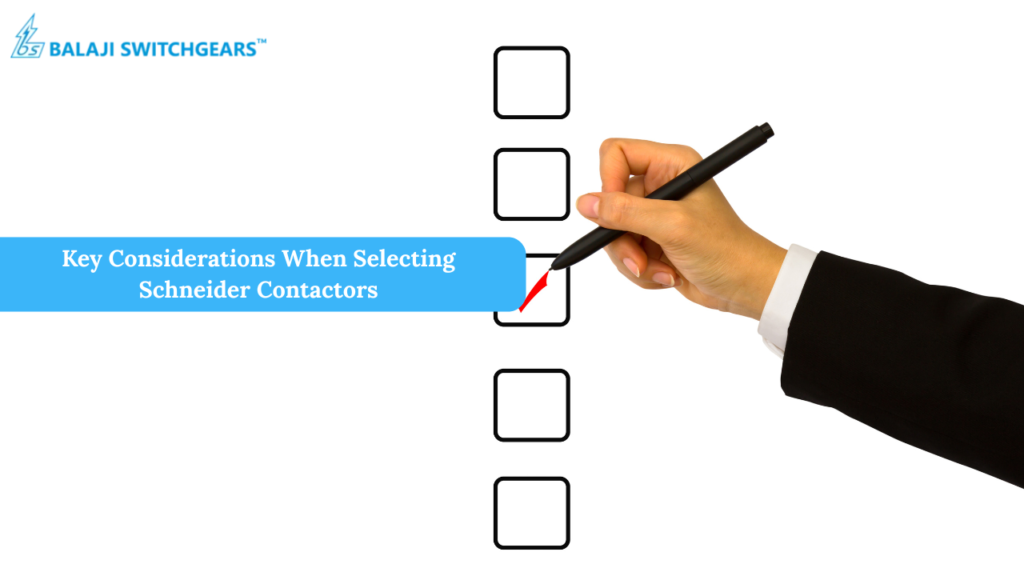Selecting the right contactor is pivotal for ensuring the reliability, efficiency, and safety of electrical systems. Schneider Electric, a global leader in energy management and automation, offers a diverse range of contactors tailored to various industrial applications. Choosing the appropriate Schneider contactor involves understanding specific requirements and aligning them with the product’s capabilities.
Understanding Contactors
A contactor is an electrically controlled switch used to control electric motors and other high-power loads. It allows remote control of electrical circuits and is essential in automation systems. Schneider Electric’s contactors, such as the TeSys series, are renowned for their durability, performance, and versatility.
1. Define the Application and Load Type
Before selecting a contactor, it’s crucial to identify the specific application and the type of load:
- Motor Control: For controlling electric motors, consider the motor’s power rating, voltage, and starting method (direct-on-line, star-delta, etc.).
- Lighting and Resistive Loads: For lighting circuits or resistive loads, ensure the contactor’s ratings match the load specifications.
- Capacitive Loads: When switching capacitive loads, select contactors designed to handle inrush currents and provide appropriate protection.
2. Determine the Current and Voltage Ratings
The contactor must be rated for the operational voltage and current of the circuit:
- Voltage Rating: Ensure the contactor’s voltage rating matches or exceeds the system’s operating voltage. Schneider Electric contactors are available for various voltage levels, including 230V, 415V, and 690V.
- Current Rating: Select a contactor with a current rating that matches or exceeds the maximum current expected in the circuit. Schneider Electric offers contactors with current ratings ranging from 6A to 630A.
3. Choose the Appropriate Number of Poles
The number of poles in a contactor corresponds to the number of phases in the electrical system:
- Single-Phase Systems: Typically require a 2-pole contactor.
- Three-Phase Systems: Require a 3-pole contactor.
- Special Applications: Some applications may require 4-pole contactors, especially when controlling both phases and neutral.
4. Consider the Coil Voltage
The coil voltage is the voltage required to energize the contactor’s coil:
- AC Coil Voltage: Common ratings include 24V, 110V, 230V, and 415V.
- DC Coil Voltage: Available in ratings like 24VDC, 110VDC, and 220VDC.
Ensure the coil voltage matches the control circuit’s voltage to ensure proper operations.
5. Evaluate the Utilization Category
Utilization categories define the type of load the contactor is designed to switch:
- AC-1: Non-inductive or slightly inductive loads (e.g., resistive heating).
- AC-3: Squirrel-cage motors.
- AC-4: Motors with high starting or plugging currents.
Selecting a contactor with the appropriate utilization category ensures longevity and reliable operation.
6. Assess the Mechanical and Electrical Durability
The durability of a contactor is measured in terms of mechanical and electrical life:
- Mechanical Life: The number of operations the contactor can perform without electrical load.
- Electrical Life: The number of operations under rated load conditions.
Schneider Electric’s TeSys contactors are designed for high durability, with some models offering up to 10 million mechanical operations and 1 million electrical operations.
7. Consider Environmental Conditions
The operating environment can impact the performance and lifespan of a contactor:
- Ambient Temperature: Ensure the contactor can operate within the expected temperature range. Schneider Electric contactors typically operate in temperatures ranging from -5°C to +40°C.
- Humidity and Pollution: For environments with high humidity or pollution levels, select contactors with appropriate ingress protection (IP) ratings, such as IP55 or IP65.
- Corrosive Atmospheres: In corrosive environments, consider contactors with corrosion-resistant materials or coatings.
8. Evaluate Control Circuit Requirements
The control circuit’s requirements influence the selection of auxiliary contacts and accessories:
- Auxiliary Contacts: Determine the number and type (normally open or normally closed) of auxiliary contacts needed for the control circuit.
- Coil Suppressors: Use coil suppressors to protect the control circuit from voltage spikes caused by coil de-energization.
- Timers and Relays: Integrate timers and relays for time-delay operations or overload protection.
9. Ensure Compliance with Standards and Certifications
Compliance with international standards ensures the contactor’s reliability and safety:
- IEC Standards: Schneider Electric contactors comply with IEC 60947-4-1 for low-voltage switchgear and controlgear.
- UL and CSA Certifications: For markets in North America, ensure the contactor has UL and CSA certifications.
- CE Marking: Indicates compliance with European Union safety, health, and environmental requirements.
10. Consider Future Expansion and Compatibility
Plan for future system expansions and ensure compatibility with existing equipment:
- Modular Design: Choose contactors with a modular design to facilitate future upgrades.
- Communication Protocols: For advanced applications, select contactors compatible with communication protocols like Modbus or Profibus.
- Integration with PLCs: Ensure the contactor can be integrated with programmable logic controllers (PLCs) for automated control.
Conclusion
Selecting the right Schneider contactor involves a comprehensive assessment of the application’s requirements, environmental conditions, and system specifications. By considering factors such as load type, voltage and current ratings, utilization category, durability, environmental conditions, control circuit requirements, compliance with standards, and future expansion needs, you can ensure the reliable and efficient operation of your electrical systems.
Schneider Electric’s TeSys series offers a wide range of contactors designed to meet diverse industrial needs. By partnering with authorized distributors like Balaji Switchgears, you can access expert guidance and support in selecting the most suitable contactor for your application.

